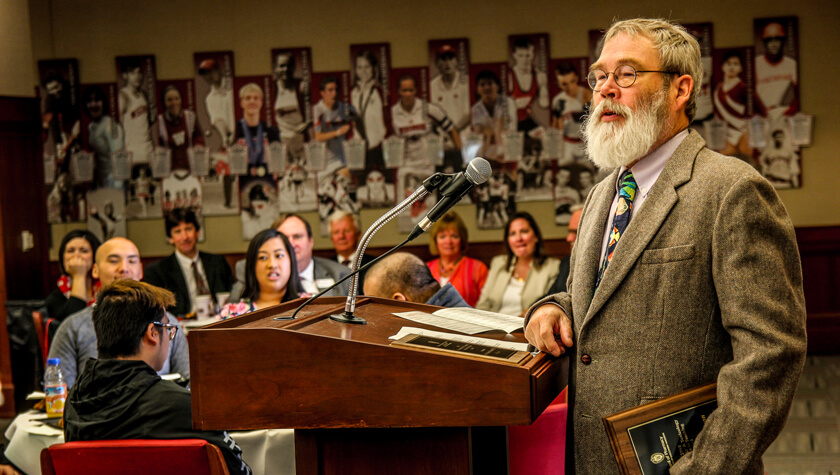
By Jasmyn Booker
After 30 years at the School of Pharmacy (SoP), Warren Heideman is retiring from his role as a Pharmaceutical Sciences Division (PSD) Professor.
As a child, Heideman dreamed of being a scientist. He fulfilled that dream when he obtained his bachelor’s degree in zoology and chemistry and a PhD from one of the first molecular pharmacology departments in the country at the University of Washington. He went on to do post-doctoral work in immunology at the University of California, Berkley, followed by more post-doctoral work at the University of California San Francisco to study Ras regulation.
Heideman arrived at the UW–Madison SoP on August 28, 1988, and has made great contributions to education, research, and teaching ever since.
“My favorite memory has been having the privilege to stand in front of each PharmD class. Our students are the cream of the crop. To lecture in front of such audiences is such an honor. I was always humbled by it,” said Heideman.
During his time at the School, he trained 24 graduate students, 11 post-doctoral students, and taught Pharmacology to countless nursing and PharmD students. In 2019, Heideman’s PharmD students selected him as DPH-2 Teacher of the Year. In the nominations, students mentioned his sense of humor, interactive lectures, and the tendency to go above and beyond for students.
“Dr. Heideman always finds ways to keep students engaged during the early morning pharmacology lectures. I looked forward to class every morning and I don’t think there was a single class period where I didn’t laugh at least once,” said one of Heideman’s second-year pharmacy students.
Another student added, “Dr. Heideman is one of those unique professors you will recall years after graduating from school. He’s a once in a generation type of professor!”
Heideman and his lab made great contributions to research over the past three decades. He has 100 publications that have been cited over 6,000 times. His work was published in a range of journals that include Genetics, JBC, J Bact, PNAS, Embo J, Tox Sci, and Nature. He obtained funding from the National Institutes of Health (NIH), National Science Foundation (NSF), American Chemical Society (ACS), Department of Energy (DOE), National Oceanic and Atmospheric Administration (NOAA), Leukemia Society, Pharmaceutical Research and Manufacturers of America (PhRMA), the UW Graduate School, and the SoP to support his research.

“Warren thinks outside the box and oftentimes has very novel insights. He’s always really appreciated on committees and meetings because he always contributes and brings a wonderful sense of humor. He’s just a really good colleague,” said Ron Burnette, PSD division chair, professor, and associate dean for faculty affairs.
Heideman had many roles and served at the national level as a member of study sections and panels for the NIH and NSF. He also served on university-level committees including the Biology Divisional Committee and numerous committees within the SoP. Additionally, he was associate dean for faculty affairs for two years, followed by eight years as associate dean for research.
“Every school committee that I served on with Warren was much more interesting with his humor, independent thinking, and fearless sharing of insights that often departed from the status quo. He made us really think,” said SAS Professor Betty Chewning.
After a long and fulfilling career, Heideman is looking forward to his retirement. He plans to build furniture, saw a tree into finished lumber, rebuild Porsche motors, and maybe spend some time listening to the ocean.
“Professor Warren Heideman will be greatly missed by the Pharmaceutical Sciences Division and SoP community,” said Graduate Programs Coordinator Ken Niemeyer. “He has a one-of-a-kind personality and is extremely kind. Thanks, Warren, for all you have poured into building great pharmacists and scientists at the SoP for all of these years.”
When asked about the legacy he would like to leave behind, Heideman said, “I think the school is affected by the collective legacy of all of us. I hope that I will have helped in that process. We are all in this together.”